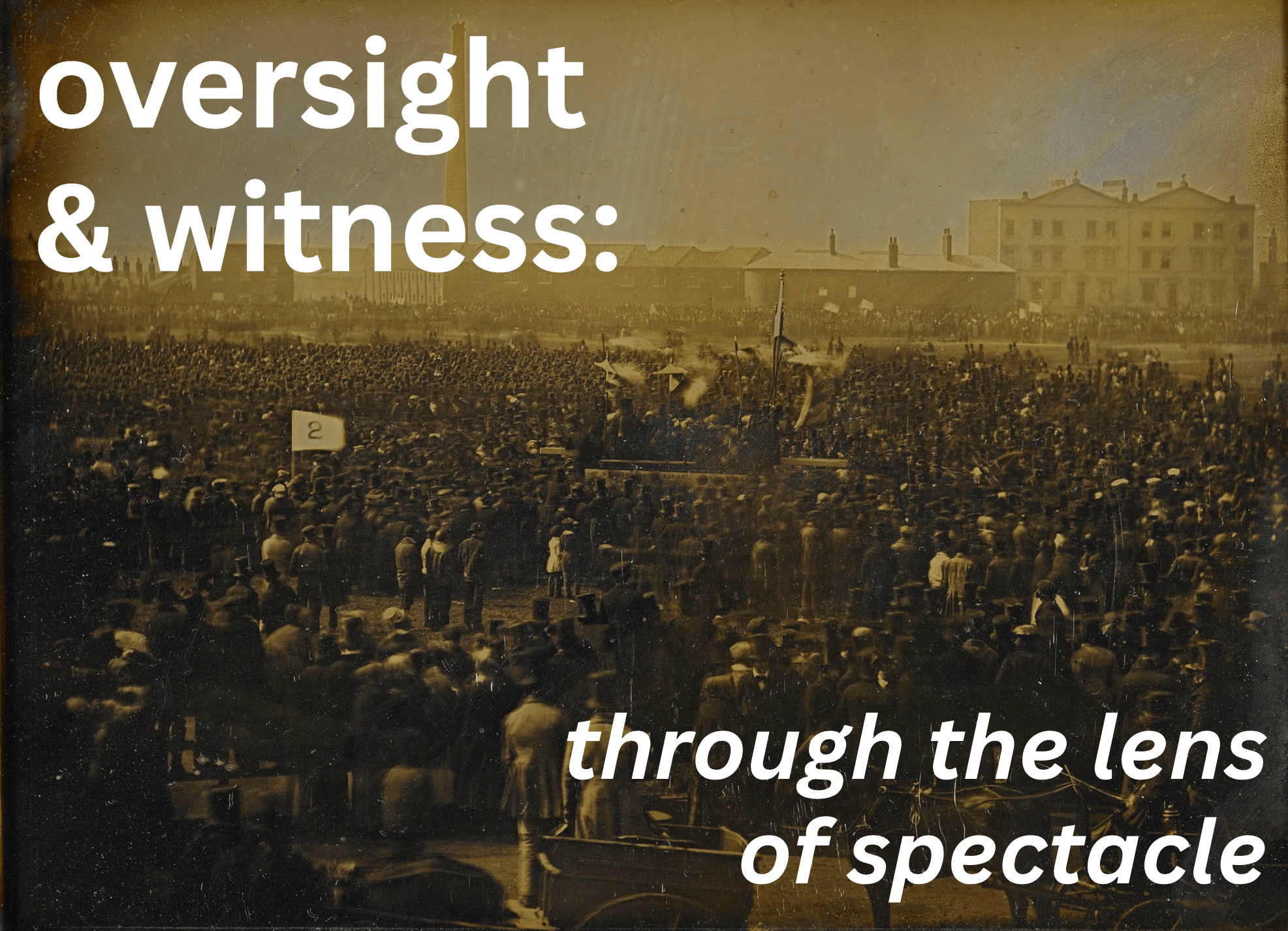
- This event has passed.
Through the Lens of Spectacle: Panel 2, Witness

Yale Working Group on Globalization and Culture
“The spectacle is the bad dream of modern society in chains, expressing nothing more than its wish for sleep,” Guy Debord declared in The Society of the Spectacle (1967): it is “a permanent opium war.” A half-century later, the specter of the spectacle continues to haunt Marxist cultural studies. Do we still sleep in Debord’s spectacle, a world of images, infinitely consumable and reproducible, devoid of meaning outside the hollow, homogenous temporality of the commodity? Or have we entered an age where the audience is more appropriately conceived, not as isolated onlookers, but as a network of users–with unprecedented access to digital information while subjected to pervasive forms of control and surveillance? Does “a critical theory of the spectacle” still allow us to make sense of shared sensorial flashpoints, past and present? And what does it mean to be a spectator–to regard, to look, to witness? In two linked panels, the Yale Working Group on Globalization and Culture proposes to track “the worldwide division of spectacular tasks” from lens manufacture to retail logistics, stadiums to camptowns, polar expeditions to spring festivals, as well as revolutionary specters in novels and borders, assassinations and squares.
The second panel, “Witness,” asks how various spectral presences–of memory, rebellion, interiority, history–demand us to account for spectacle’s reversals, negations, and reenactments in mass protests and counter-spectacles. Is the society of the spectacle necessarily also one of bearing witness? In “Delineating Specters,” Javier Porras Madero considers how the conjuration and nationalization of specters deepened the contradictions of border formation in the decades following the Mexican Revolution. In “Spectacles of Sympathy,” Morgan E. Freeman analyzes human interest stories produced in the age of polar exploration to consider this genre as a vehicle for mythologies of the bourgeoisie. In “Spectacular Reversal,” Damanpreet Pelia reflects on the spectacle of political violence by tracking the spectral presence of the bāz (from the Persian for hawk) in the assassination of Prime Minister Indira Gandhi by Satwant Singh and Beant Singh in 1984. In “The Spectacle of the Mass Demonstration,” Michael Denning reflects on Marx’s account of mass demonstrations and universal suffrage in the wake of a decade of occupations: citizens in the streets and elected populists as the religion of everyday life. In “Detouring the US Military Camptown,” Madeleine Han explores tourism as memory work toward remembering the US military’s legacy and ongoing occupation of Korea.
The Yale Working Group on Globalization and Culture is an interdisciplinary cultural studies research collective that has been practicing at Yale University since 2003. Over the years, we have presented our work at the Left Forum, Historical Materialism, the Marxist Education Project, Occupy Boston, and the World Social Forum. Past projects have appeared as “Going into Debt,” online in Social Text‘s Periscope, and as “Spaces and Times of Occupation” in Transforming Anthropology; a collective interview regarding “Matters of Life and Death” was published in Revue Française d’Études Américaines. Our current members are: Damanpreet Pelia (doctoral researcher in American Studies; research interests include religion, sovereignty, and empire); Henry Zhang (doctoral researcher in English; research focuses on the aesthetics of post-war memory and post-socialist transition in East Asia and its diaspora during the long cold war); Jane Zhang (doctoral researcher in Comparative Literature and Film & Media Studies; research focuses on the intersecting history of medicine, consumer culture, and notions of selfhood); Javier Porras Madero (doctoral researcher in Latin American history; research focuses on revolution and border formation); Jess Cruz (doctoral researcher in History; research focuses on the history of Miami, Florida as a center for the Latin American Right across the 1980s-1990s); Madeleine Han (doctoral researcher in American Studies; research focuses on US militarism, cold war cultures, and overlapping imperialisms in Asia); Michael Denning (professor of American Studies; research focuses on labor, critical theory, and social movements); Morgan E. Freeman (doctoral researcher in American Studies; her research focuses on the contemporary art and visual cultures of Black and Native practitioners as it relates to belonging and place specificity); Sofia Cutler (doctoral researcher in American Studies; research traces the cultural and political history of last-mile delivery–or the last-leg of a product’s long journey across supply chains to a customer’s front door; and Suvij Sudershan (doctoral researcher in English and Film; research focuses on 19th and 20th century global anglophone, francophone, and South Asian vernacular literature, the development of the novel, ideas of realism and modernism, and the depiction of peasant revolt and rural modernization).
